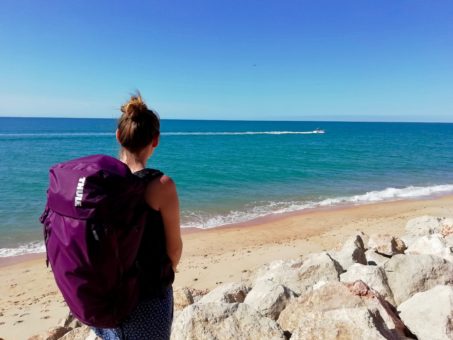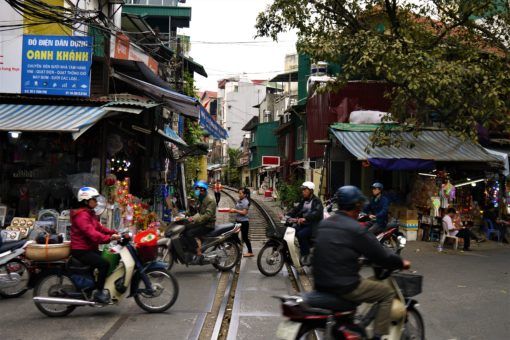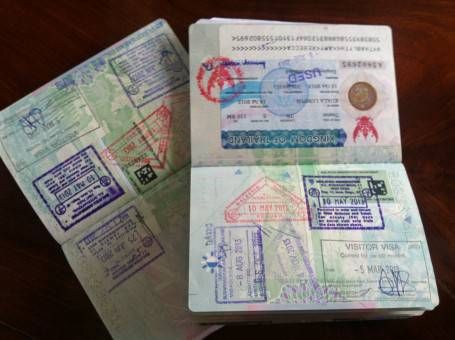24 Jan Moving to a New Country: Survival Tips
Looking for adventure? Moving to a new country has to be one of the most exciting life changes you can make, but also one of the scariest. We know this from experience, having lived in Thailand, Vietnam and Portugal, encountering visa issues, culture shock and even bats in our apartment along the way. If you’re planning on moving to another country, here’s a few survival tips I’ve picked up over the last five years.
Why I think moving to a new country will change your life
If you have the means, I firmly believe that living abroad is an essential experience. Just imagine, you’ll be plunged into a different culture, surrounded by new places, people, customs, food and language. Sure, it’ll be tough and you’ll be pushed well out of your comfort zone, but I think nothing worth doing in life is easy. You’ll grow as a person, gain some valuable perspective and have some pretty cool stories to tell at the end of it.
Take living in Hanoi, Vietnam. Moving to this chaotic capital city to teach in public schools was one of my favourite, yet craziest, life experiences to date. Just figuring out how to cross the road without getting run over was a challenge, as was learning to teach a class full of 50 kids, work with Vietnamese colleagues and navigate the disorganised work procedures. That’s not to mention having to find an apartment, make friends, deal with the sweltering heat and learn to ride a motorbike.

I remember walking past a dog roasting on a spit on my way to school, the time a bat flew out of our apartment loft and the over-crowded, dirty conditions at the local hospital where I had to get a medical check for my work visa. I’ll never forget the corrupt traffic police, the stick teachers threatened kids with, or having to wear a face mask while driving around the city because of the pollution. Living in Vietnam really opened my eyes and there were times I found the experience incredibly challenging.
Then there were the highs though. The boisterous, eager kids at school shouting out ‘Hello Teacher!’ the friendships we forged and shopping at the local market. I remember making paper lanterns at school for the TET holidays, receiving a bag of star fruit from a Vietnamese colleague, a little old woman taking my arm and helping me cross a busy street and practising English with the owner of a café where I’d sit and lesson plan.

In short, the effects of moving to another country will be life-altering. You’ll learn how other people around the world live, figure out how to survive and thrive in unfamiliar surroundings, make new friends and have a ton of fun along the way.

I want to move abroad – but where?
Have I convinced you that moving abroad is a great idea? Then you need to start considering different countries to move to. Is there a place you’ve visited and fallen in love with? Perhaps you’ve always dreamed of learning French or wanted to live on a tropical island? I think you can’t go wrong in life if you follow your passions, so go with your gut instincts. Practically, here are a few things to consider though when deciding where to move abroad.

How long do you want to live abroad for?
You might dream of living abroad for a year or plan on moving overseas for good. Perhaps you want to take a gap year after university or permanently retire to warmer climes. Figuring out how long you want to live abroad for will help you plan visas, work options and housing. As an example, we lived in both Chiang Mai and Hanoi (and we’re now based in Portugal) for a year. I think this is a good amount of time to get a feel for a place and figure out whether you want to stay long-term. However, we’ve also enjoyed shorter stays of around a month in destinations like Prague, Split and Medellin.

How far do you want to travel?
Are you keen to stay close to your home country so you can easily visit friends and family and have them visit you? Or are you looking for a real cultural change and prefer the idea of moving to the other side of the world? At the start of our travels we wanted to explore as far away from the UK as possible, in places that felt really exotic to us. However, these days we prefer to be based in Europe so we can visit family and friends more.

Will you need to work?
Consider how you’ll sustain yourself when relocating to another country. It’s possible to simply save up enough money to support yourself in countries where the cost of living is lower. For instance, we spent nearly a year and a half travelling on our hard-earned savings, mainly in Asia, before we needed to get jobs abroad. If, however, you plan on living overseas somewhere more expensive like Europe or Australia, you’ll likely need to find a job once you arrive. Either way, with a bit of planning you can make it work. During our travels we’ve taught abroad and earned money working as digital nomads online.
 Can you get a visa?
Can you get a visa?
Moving to a foreign country can be a nightmare when it comes to visas. Once you have a short list of potential countries, check the visa regulations for each one to see whether you’re able to live and potentially work there. The rules vary by country and depend on nationality. For example, we needed a job and work visas to live in Vietnam and had to make expensive visa runs to nearby countries every three months when we lived in Thailand. By contrast, since the UK is still (barely) in the EU, at the moment we can live in Portugal visa free.
2023 update: Brexit means we can now only stay for 90 days at a time in EU countries, unless we apply for a temporary residence visa. We’ve spent 2022-23 travelling the USA and Canada in an RV and think North America would be a great alternative for a longer-term stay – we get six months at a time on our ETA for Canada for example. One of the best pathways for gaining residency and work authorisation is through a common-law partner sponsorship in Canada (parrainage de conjoints de fait au Canada), which would work if you have a Canadian partner and meet the relevant legal requirements.
Finding an apartment
Finding a great place to live abroad can be a real struggle, so we’ve always relied on the help of local estate agents to find apartments in Chiang Mai, Hanoi and Portugal. They’ll have great knowledge about prices and the best areas to live but be patient, because finding the perfect apartment can take time.
Moving to a different country – survival tips
So, you’ve made the decision to relocate and picked a country, now you need some advice on how to move abroad. Here are a few essential survival tips to get you started:
- Calculate your moving costs – plane tickets, visas, apartment deposits and furniture costs – all these things can add up to a hefty sum. Even if you’re just moving abroad for a year, make sure that you save a few thousand pounds to cover your initial moving costs.
- Pack wisely – packing to move abroad can be one of the trickiest tasks. Luckily, we’re pretty minimalist and have spent the last six years living out of tiny backpacks, so we don’t need much to keep us happy. Start by researching the weather and packing the essentials but remember that you can buy pretty much anything you need abroad. Don’t forget to add in some priceless home comforts though, we always travel with Marmite and Earl Grey tea bags.

- Research like crazy – read guide books, blogs by other travellers and expats and any information you can get your hands on about your new home. Nothing can truly prepare you for the big move but researching always puts me at ease and helps manage my expectations.
- Connect with other expats – to help you settle in, connect with other travellers and expats via Facebook groups and websites. This can be a great way to meet people as well as find accommodation, get travel tips and advice about your new home.
- Give it time – relocating abroad can be a scary, disorientating process. It takes courage to say goodbye to everyone and everything you know and embrace the unknown. So, go easy on yourself and give it time. You may feel right at home as soon as you arrive, but it’s likely that you’ll need a few weeks to settle in and acclimatise. Just be patient and remember, there’s nothing wrong with getting a bit homesick.

- Stay in touch – the biggest challenge for us about living abroad is missing friends and family back in the UK. It can be particularly hard when you’re not around for holidays and big family occasions. Luckily, we have all the tools we need to stay in touch with people these days, even if we’re on the other side of the world. So, schedule regular Skype sessions, Facetime friends, invite people to come visit you abroad or plan a trip home half-way through the year.
Deciding to move abroad was one of the biggest decisions I’ve made in my life and despite the challenges involved, the most rewarding. Whether you’re dreaming of a new life in the sun, a study break in Europe or sabbatical in South America, I hope this article has inspired you to take the leap. After all, life is fleeting, so grab every new experience with both hands.










Gilda Baxter
Posted at 10:44h, 26 JanuaryGreat post with lots of good advice. I have never regretted moving to the UK. For me learning the language was crucial to really settling in and feeling part of my new country 🙂
Amy
Posted at 15:26h, 27 JanuaryThanks Gilda! Yes, great tip about learning another language, I’m sure that makes a huge difference (although we never really picked up any Thai or Vietnamese unfortunately).
Kyra Rodriguez
Posted at 10:38h, 04 FebruaryI wanna live and work abroad too! I know its not gonna be easy but I want to challenge myself to be independent and survive on my own. Thanks for the great tips though!
Amy
Posted at 12:36h, 08 FebruaryHi Kyra, it’s definitely an experience worth pursuing! Good luck 🙂